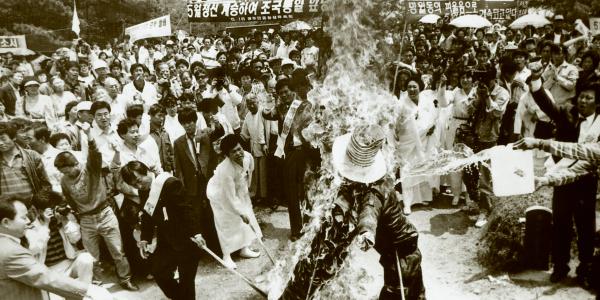Performing Democracy in the Graveyard: The Gwangju Uprising, Mangwoldong Cemetery, and South Korea’s Affective Space for Democracy
What is the relationship of grief and politics? What kind of transformative politics might arise when people in grief come together to generate an alternative future? In this talk, Hayana Kim illuminates a women-led activism for democracy in South Korea by spotlighting the Mangwoldong Cemetery. Located in Gwangju, South Korea, the cemetery is one of the most important battlefields for democracy in contemporary South Korea where the May Mothers, or the grieving mothers of the 1980 Pro-Democracy Gwangju Uprising fought for the right to mourn their deceased children during the country’s military dictatorship years. In illuminating this history, she examines an activist performance which she calls jesa activism – a commemorative activism that turned jesa, memorial rites that is otherwise a private and familial ritual, into a spectacular public assembly of anti-dictatorship protest. During jesa activism, not only did the May Mothers present spectacles of grief in demanding justice, but countless citizens also came in solidarity to bear pressure on the state by congregating in the graveyard to perform communal acts of mourning. The result was a production of the country’s most insurgent space for democracy to engender a future to be otherwise. Kim's central argument, arising from archival research and oral history interviews from ethnographic field research, is that May Mothers staged jesa activism to raise questions on what it means to foster affective democracy. The May Mothers, her work shows, teach us that a society becomes more democratic when politics derive from grief – an expansive grief in which deaths previously erased and disavowed by the state arise to take up a prominent space in communal memories. Photo Provided by the May 18 Archives (Copyright: Kim Young Bok)
Hayana Kim is an interdisciplinary performance scholar who examines artistic and activist performances in service of democracy in post-Yusin South Korea. Currently teaching in the Department of East Asian Languages and Cultures and in the Performing Arts Department at Washington University in St. Louis, she is a PhD candidate in the Interdisciplinary PhD Program in Theatre and Drama at Northwestern University. Kim is the recipient of multiple awards from national and international theatre and performance conferences including the 2021 Helsinki Prize from the International Federation for Theatre Research and two Emerging Scholars Awards from the Association for Asian Performance (2020) and from ATHE’s Performance Studies Focus Group (2017) in recognition of her projects that look at theatre and protest cultures in South Korea. Her research also received numerous grants and fellowships including the Mellon/SSRC and Mellon/ACLS fellowships, as well as support from the University of Iowa’s Korean Studies Research Network (KoRN), funded by the Korea Foundation. Three publications based on her research have appeared in a peer-reviewed journal like Asian Theatre Journal (2021), and in edited collections published with the Cambridge University Press (2020), Chonnam National University (2020). This talk comes from her fourth publication, forthcoming in an edited collection with the University of Michigan Press, which illuminates women’s contribution to facilitating a turn from dictatorship to democracy in South Korea.

